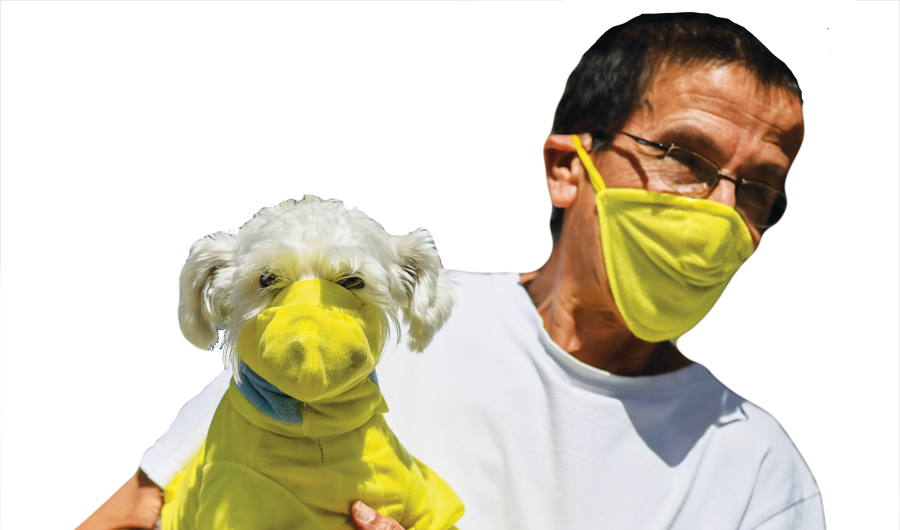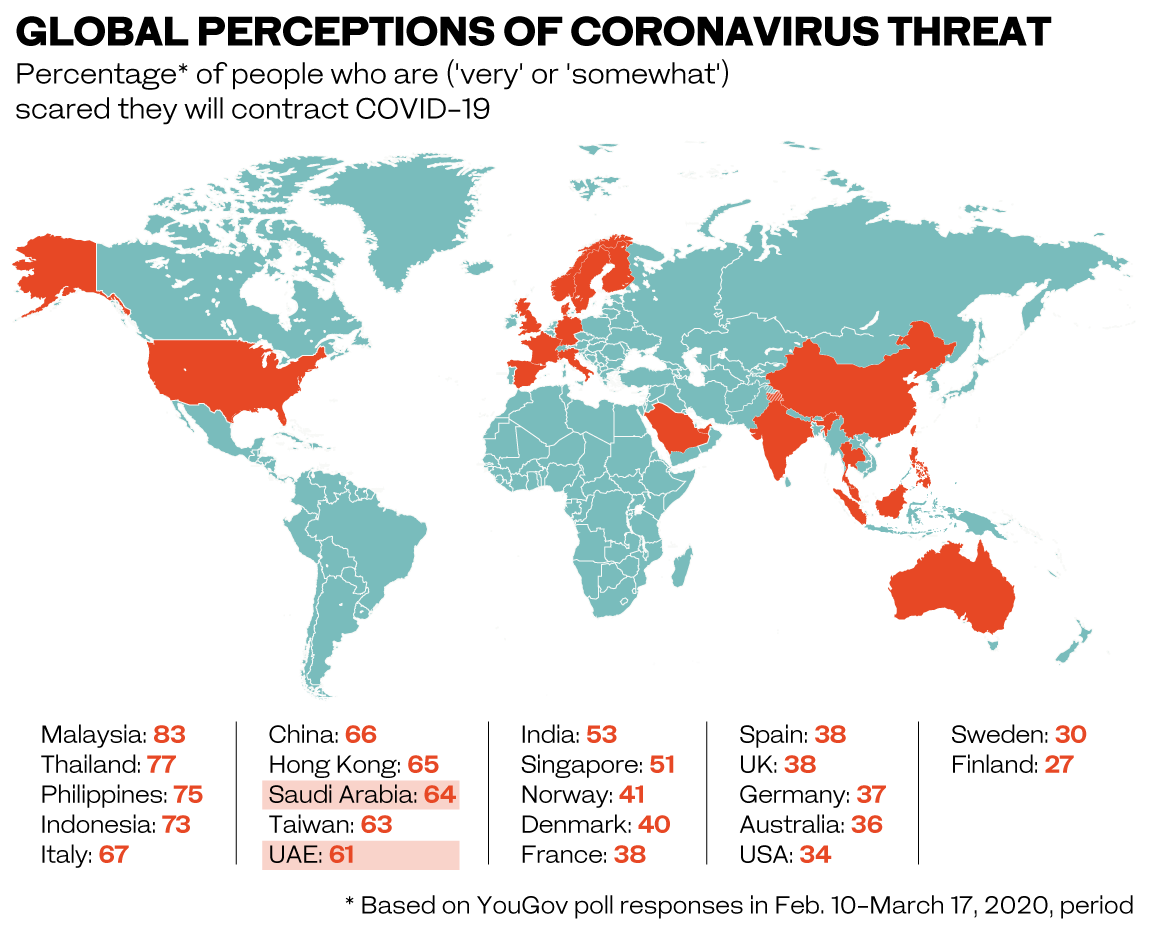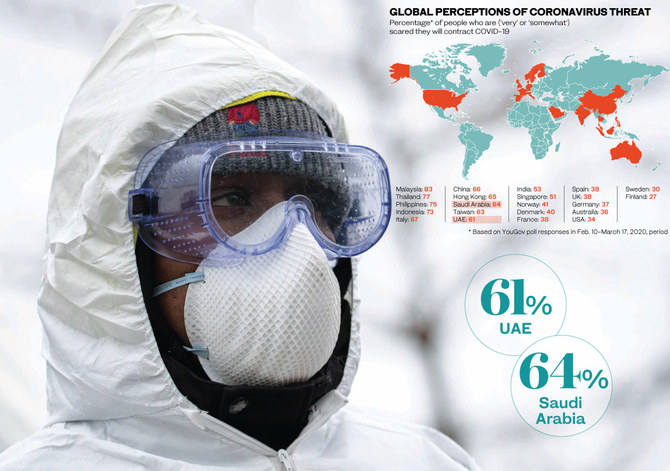DUBAI: For weeks now, the coronavirus pandemic has been dominating day-to-day life across the world, to say nothing of news headlines.
In view of the ever changing situation, global research firm YouGov has been conducting research in 25 countries to track the potential impact of the health crisis on everything from business and politics to public behavior.
As the coronavirus disease (COVID-19) reaches new parts of the world and governments and businesses respond differently in different countries, attitudes to the pandemic are evolving.
In the coming weeks, ongoing trackers such as YouGov will convey an idea of how the general population around the world is feeling about the crisis and how this is affecting different aspects of life.
YouGov’s COVID-19 data will examine what has changed and highlight key differences across 25 countries. The data gathered by the tracker, stretching as far back as late February, shows shifts that, in the normal course of things, might have taken decades.
The results show how populations globally are being forced to change their attitudes and behaviors as the number of countries and cities hit by infections continues to rise.
In addition, as the number of countries or territories with signs of local transmission of the virus increases every day, governments are taking ever more radical measures to limit propagation.
As of March 21, Johns Hopkins University in the US had tracked 275,500 confirmed live coronavirus cases globally — 81,300 in mainland China and 194,200 outside China.
The numbers represented a global increase of 156,100 cases in a week: On March 14 Johns Hopkins reported 75,100 live cases in China, and 81,000 outside.
Fear of contracting COVID-19
Those living in Asia and the Middle East are far more fearful of catching the disease — generally between 53 percent and 83 percent — than people in Europe and North America — generally between 27 percent and 45 percent.
YouGov data suggests that this is because the percentage of people in Asia and the Middle East who are familiar with the virus is higher than it is in Europe or the US.
Moreover, people in Europe and the US are far less likely than those living in Asia to see COVID-19 as a threat to public health in their own countries. In Italy, the worst affected area of the European outbreak, levels of public concern are much higher.
The most recent YouGov survey found almost three quarters of Italians were either very or somewhat scared of contracting the infection.
This is unsurprising given a significant portion of the country is in lockdown, and the number of deaths in the country now exceeds the number of deaths in China.
It is also worth noting that fear levels in Asia-Pacific countries have remained static or only risen relatively slowly since YouGov’s tracker launched in February.
The tracker has shown that fear of contracting COVID-19 has risen the fastest in Europe. For instance, the UK saw an increase in fear levels from 24 percent to 48 percent in between March 1 and March 20, while the jump in Germany was from 21 percent to 37 percent between March 4 and March 16.
Preventative measures
The YouGov tracker results show that COVID-19 has had a greater impact on behavior in Asia and the Middle East so far than it has in Europe and North America.
The most visible difference in global attitudes comes down to face-mask use. In almost all European countries, and the US and Canada, use of masks is below 10 percent. In most Asian countries, however, it is around half or more, and rises to as high as 86 percent in China, Hong Kong and Taiwan.
At between 35-39 percent, use of face masks in the Middle Eastern is below the Asian range.
As the coronavirus spreads further through the US, these attitudes may change. At the end of February, 25 percent of Americans said they were very likely to consider wearing a face mask when in crowded public spaces such as airports or on public transportation, while 27 percent said they were somewhat likely to consider doing so.
Attitudes to social distancing
Distinctions between global regions are less obvious when it comes to support for measures that national governments could take to combat the spread of infections.
Generally speaking, the most popular measures are to quarantine anyone who has come into contact with a COVID-19 patient, alongside banning and quarantining flights from China and other countries with active cases.
Public opinion in Germany in particular has registered the most notable swing in favor of banning flights from the rest of the world.
While only 29 per cent of Germans supported banning flights from countries with COVID-19 cases at the beginning of March, this figure has since risen to 50 percent.
Over the same time period, the number of Germans wanting to ban flights from China specifically has risen from 41 percent to 53 percent.
Attitudes in Indonesia are significantly different from the rest of its regional neighbors. At the time other Asian countries were seeing large numbers choosing to avoid crowded places, the figure in Indonesia barely shifted from 26 percent to 31 percent.
It has since risen to 51 percent, but this still puts Indonesia far behind their neighbors.
Impact on businesses
While many businesses are braced for the potentially devastating economic impact of coronavirus, some brands are benefiting.
Following reports of 10 confirmed coronavirus deaths in Hong Kong, residents began queueing up overnight outside pharmacies to stockpile face masks.
As a response to this, on January 31, Watsons, a Hong Kong chain, announced on its Facebook page that each of its 230 branches would supply face masks, and a quota system would be but in place for each customer to prevent stockpiling.
It also reassured customers that more would be arriving in early February. In addition to this, it pledged to donate face masks to the elderly.
Watsons’ response to the coronavirus in this time of fear and panic has boded well for its brand health scores.
Since the start of the year, YouGov BrandIndex data has shown a significant jump in their awareness and customer recommendation scores.
In the UK, as many make preparations for social distancing, perhaps unsurprisingly, BrandIndex data has shown positive results for key home comfort providers — Deliveroo, Netflix and Andrex.
Governments under pressure
According to an Economist/YouGov poll, a majority of Americans (56 percent) said the government should be spending more to protect the country against the spread of infectious diseases.
Many (41 percent) also felt US President Donald Trump was not taking the virus seriously enough.
With UK Prime Minister Boris Johnson’s government taking increasingly strict steps aimed at trying to bring COVID-19 under control, a YouGov survey for the UK’s Channel 5 News examined what Britons thought of the state response so far.
When surveyed on March 16 and 17, close to four out of 10 (38 percent) said the government was not reacting to the coronavirus outbreak sufficiently.
A similar figure believed the reaction to be about right, while 10 percent thought the government’s response was an overreaction.
Since then, the UK has announced that schools, restaurants and gyms will close and loans would be made available to businesses affected by the pandemic.
In Asia, the data suggests a huge shift in public desire for respective Asian governments to distribute free face masks. The shift took place between late February and early March — just when people in these areas were also starting in large numbers to avoid crowded public places.
Figures rose by at least 24 percent in each country, with the increase particularly rapid in Malaysia (from seven percent to 57 percent) and the Philippines (eight percent to 54 percent).


























